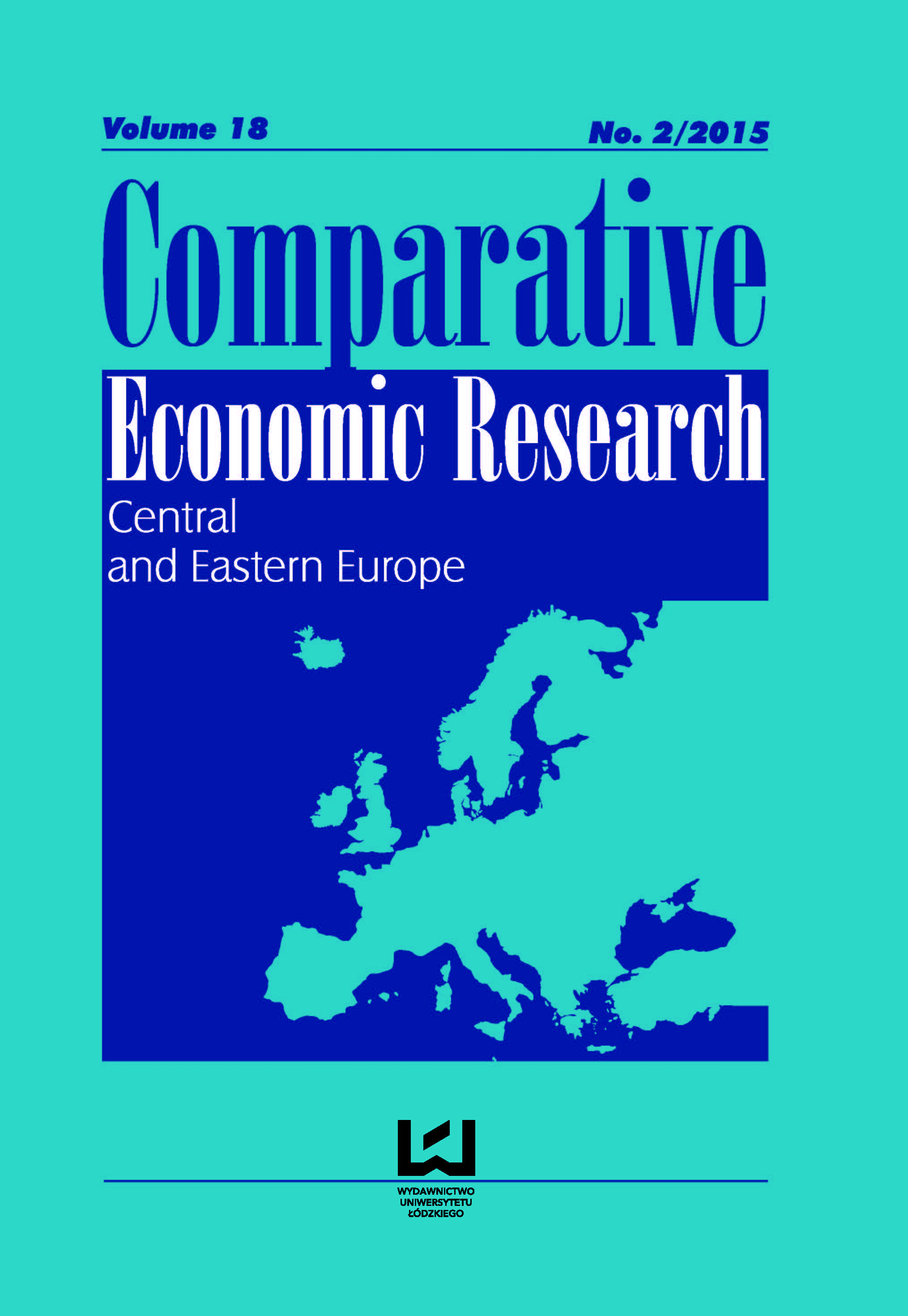Tax Competition Or Tax Coordination? What Is Better For The European Union?
DOI:
https://doi.org/10.1515/cer-2015-0011Keywords:
tax competition, tax havens, tax harmonization, tax coordinationAbstract
Tax competition is defined as the use of tax policy that will allow to maintain or increase the attractiveness of a particular territory for business location. Tax competition is used especially by the relatively under-developed countries, as foreign capital inflow gives them the possibility to implement modern technology, new management methods, or to increase exports. One of the effects of tax competition is the formation of tax havens, i.e. countries or territories offering preferential tax rates in order to gain capital from abroad. A comparative analysis of the income tax rates in the EU countries and certain tax havens shows that despite the progressive reduction of the rates of these taxes in the EU, the phenomenon of tax competition is still very strong, and the position of tax havens as countries with relatively low or very low taxes seems to be unthreatened. The question arises whether tax competition is a real problem for the EU Member States and if there exist arguments for tax harmonization, or at least tax coordination within the EU countries. The discussion in this paper suggests that the arguments for tax coordination in the EU are not yet strong enough. However, both tax competition and tax coordination have their supporters and opponents.
Downloads
References
Baldwin R. E., Krugman P. (2004), Agglomeration, integration and tax harmonisation, European Economic Review No 48.
Google Scholar
Baskaran T, Lopes da Fonseca M. (2013), The Economics and Empirics of Tax Competition: a Survey, CEGE Discussion Papers, No 163.
Google Scholar
Bradford D., Oates W. (1971), The analysis of revenue sharing in a new approach to collective fiscal decisions, Quarterly Journal of Economics No 85.
Google Scholar
Brennan G., Buchanan J. (1980), The power to tax: analytical foundations of a fiscal constitution, Cambridge University Press, Cambridge.
Google Scholar
Bucovetsky S. (1991), Asymmetric tax competition, Journal of Urban Economics No 20.
Google Scholar
Devereux M. P., Loretz S. (2012), What do we know about corporate tax competition, Oxford University Centre for Business Taxation Working Paper No 12/29.
Google Scholar
European Council - 24/25 March 2011 - Conclusions, General Secretariat of the Council, European Council 2011, http://www.consilium.europa.eu/uedocs/cms_data/docs/pressdata/en/ec/120296.pdf
Google Scholar
Głuchowski J (2006), Polskie prawo podatkowe, Wydawnictwo Prawnicze LexixNexis, Warszawa.
Google Scholar
Głuchowski J. (1998), Sojusz dla korzyści - współdziałanie oaz podatkowych [in:] J. Komar (ed.), Koncepcje współczesnych reform podatkowych. Europa na drodze do wspólnej waluty, Wydawnictwo Wyższej Szkoły Bankowej, Poznań.
Google Scholar
Harmful Tax Competition: An Emerging Global Issue (1998), OECD, Paris.
Google Scholar
Hybka M. (2002), Harmonizacja podatków a konkurencja podatkowa między państwami Unii Europejskiej, Zeszyty Studiów Doktoranckich No. 4, Wydawnictwo AE w Poznaniu, Poznań.
Google Scholar
Konrad K. (2009), Non-binding minimum taxes may foster tax competition. Economics Letters No 102.
Google Scholar
Krajewska A. (2012), Podatki w Unii Europejskiej, PWE, Warszawa.
Google Scholar
Kuchciak I. (2012), Raje podatkowe w zmniejszaniu obciążeń podatkowych, Wydawnictwo Uniwersytetu Łódzkiego, Łódź.
Google Scholar
Lipowski T. (2004), Raje podatkowe a unikanie opodatkowania, Wydawnictwo C.H. Beck, Warszawa.
Google Scholar
Ludema R., Wooton I. (2000), Economic geography and the fiscal effects of regional integration, Journal of International Economics No 52.
Google Scholar
Nawrot R.A.(2011), Szkodliwa konkurencja podatkowa, Wydawnictwo Difin, Warszawa.
Google Scholar
Oates W. (1972), Fiscal federalism. New York: Harcourt Brace Jovanovich.
Google Scholar
Official Journal of the European Communities (1998), European Commission, Brussels.
Google Scholar
Oręziak L. (2007), Konkurencja podatkowa i harmonizacja podatków w ramach Unii Europejskiej. Implikacje dla Polski, Wydawnictwo Wyższej Szkoły Handlu i Prawa im. Ryszarda Łazarskiego w Warszawie, Warszawa.
Google Scholar
Peralta S., Ypersele T. (2006), Coordination of capital taxation among asymmetric countries, Regional Science and Urban Economics No 36.
Google Scholar
Skiba L.(2011), Polityka fiskalna w unii walutowej, Instytut Sobieskiego, Warszawa.
Google Scholar
Sorensen P. B. (2004). International tax coordination: regionalism versus globalism, Journal of Public Economics No 88.
Google Scholar
Szafoni M. (2011), Międzynarodowa konkurencja podatkowa, Zeszyty Naukowe Kolegium Gospodarki Światowej, Szkoły Głównej Handlowej, Warszawa.
Google Scholar
Taxation trends in the European Union, Eurostat, Statistical Book, 2013 edition.
Google Scholar
Tiebout C. (1956), A pure theory of local expenditures, Journal of Political Economy No 64 (5).
Google Scholar
Wang Y.Q. (1999), Commodity taxes under fiscal competition: Stackelberg equilibrium and optimality, American Economic Review No 89.
Google Scholar
White M. J. (1975), Firm location in a zoned metropolitan area. [in:] Oates W. (ed.), Fiscal zoning and land use controls. D. C. Heath, Lexington, MA.
Google Scholar
Wildasin D. (1998), Nash equilibria in models of fiscal competition, Journal of Public Economics No 33.
Google Scholar
Wilson J. D. (1986), A theory of interregional tax competition, Journal of Urban Economics No 19 (3). doi: 10.1016/0094-1190(86)90045-8
Google Scholar
Wilson J. D. (1999), Theories of tax competition, National Tax Journal No 52.
Google Scholar
Zodrow G.(2003), Tax Competition and Tax Coordination in the European Union, International Tax and Public Finance No10, pp. 651-671.
Google Scholar
Zodrow G. R., Mieszkowski P. (1986), Pigou, Tiebout, property taxation and the under-provision of local public goods, Journal of Urban Economics No 19.
Google Scholar
Downloads
Published
How to Cite
Issue
Section
License

This work is licensed under a Creative Commons Attribution-NonCommercial-NoDerivatives 4.0 International License.











